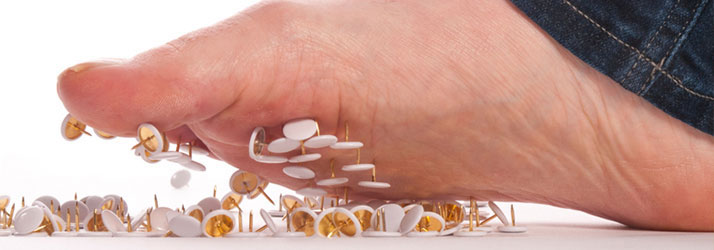Peripheral Neuropathy in
Fort Worth TX

Peripheral neuropathy is a disorder that affects the nerves outside of your brain and spinal cord, causing numbness and pain in your hands, feet, or legs. While effects will depend on the nerves impacted, patients may experience symptoms ranging from numbness and weakness to extreme sensitivity. Through an individualized peripheral neuropathy treatment plan in Fort Worth, our doctors at Texas Injury Clinic, can reduce your discomfort and return function to affected areas.
What is Peripheral Neuropathy in Fort Worth
The peripheral nervous system transmits information from your brain and spinal cord to the rest of your body. When the peripheral nerves are damaged, numbness, weakness, or pain can follow. Peripheral neuropathy typically occurs in the hands and feet, however other parts of the body can be affected as well.
There are three types of nerves in the peripheral nervous system. These include:
- Sensory Nerves: These nerves are responsible for sensations, including pain, vibration, touch, or temperature.
- Motor Nerves: Muscle movement is controlled by motor nerves.
- Autonomic Nerves: Functions such as heart rate, blood pressure, digestion, and bladder are controlled by the autonomic nerves.
Peripheral neuropathy can affect one nerve, in the case of carpal tunnel syndrome, or multiple nerves.
Common Symptoms
Symptoms of peripheral neuropathy are vast and varied, and they correspond to the nerves damaged. Warning signs can include:
- Pain that is sharp, throbbing, jabbing, freezing, or burning
- Gradual onset of tingling, prickling, or numbing sensations beginning in the hands and feet and moving into the arms and legs
- Lack of coordination
- Extreme sensitivity to touch
- Muscle weakness or paralysis
- Sensitivity to heat
- Bladder, bowel, or digestive issues
- Fluctuations in blood pressure, leading to lightheadedness or dizziness
If you notice symptoms, you should schedule a medical consultation right away. The sooner peripheral neuropathy is diagnosed, the better your chances of successfully controlling symptoms.
Causes of Peripheral Neuropathy
Neuropathy can develop as a result of a number of conditions. Common causes include:
- Diabetes: According to the American Diabetes Association®, about 50 percent of those living with diabetes develop some form of neuropathy.
- Autoimmune Diseases: These can include Sjogren’s syndrome, rheumatoid arthritis, lupus, Guillain-Bare syndrome, necrotizing vasculitis, and chronic inflammatory demyelinating polyneuropathy.
- Alcoholism: Consuming excessive amounts of alcohol and poor dietary choices can increase your chances of developing this condition.
- Toxins: These poisonous substances include certain metals or chemicals.
- Infections: Bacterial or viral infections, such as shingles, Lyme disease, Epstein-Barr, leprosy, diphtheria, hepatitis C, and HIV are all risk factors for peripheral neuropathy.
- Medications: Some medications, such as cancer drugs, may increase the chance of peripheral neuropathy.
- Family History: Genetic types of neuropathy include Charcot-Marie-Tooth disease.
- Trauma: Sports-related injuries, car accidents, or falls can damage or sever the peripheral nerves.
- Tumors: Malignant or benign growths can put excessive pressure on the peripheral nerves.
- Bone Marrow Disorders: These include monoclonal gammopathy, osteosclerotic myeloma, amyloidosis, and lymphoma.
- Vitamin Deficiencies: Niacin, vitamin E, and vitamins B-1, B-6, and B-12 are all necessary for proper nerve function.
- Other Diseases: These include liver disease, kidney disease, hypothyroidism, and connective tissue disorders.
During your first visit, we can evaluate your medical history and recommend a treatment plan that addresses the underlying cause of your condition.
Electrical Stimulation Therapy
Electrical stimulation therapy calms the nerves and increases blood flow to affected areas, allowing the nerve cells to heal. It can be used to treat a variety of conditions but has proven to be most effective for neuropathy patients. This treatment is FDA approved, totally safe, non-invasive, painless, and has no side effects.
ReBuilder® Electrical Stimulation Device - 94% Proven Effective
At Texas Injury Clinic our pain specialists use the industry-leading ReBuilder® product. It's a highly-sophisticated medical device that alleviates pain, calms overactive nerves, stimulates underactive nerves, strengthens muscles, and increases local blood flow. It has been shown to be 94% effective in treating neuropathy.
LEARN MORE HERE
Customized physical rehabilitation
Exercise routines can improve muscle strength, reduce pain, and enhance range of motion. There are four types of exercises that we may recommend, including:
- Aerobic Exercises: Walking, swimming, and low-impact aerobics are excellent ways to increase your heart rate and raise your breathing rate.
- Flexibility Exercises: Various stretching exercises, such as a calf stretch or seated hamstring stretch, can reduce your chance of injury.
- Strength Training Exercises: Chair squats, calf raises, and seated dorsiflexion can help you regain strength in weakened muscles.
- Balance Exercises: These exercises can help you overcome the sensation of unsteadiness or dizziness, as well as help, prevent falls and other balance-related injuries.
At Texas Injury Clinic, we design a customized physical rehabilitation program for every patient. Using advanced physical rehabilitation equipment, including functional capacity devices, Cybex® fitness equipment, an upper-body ergometer, and more, our team of doctors can provide the comprehensive care you need for a successful treatment.
Schedule Your visit
If you are experiencing signs of peripheral neuropathy, schedule a consultation with one of our experienced doctors at Texas Injury Clinic. Prior to your visit, please compile a list of symptoms, important personal information, any medications you are currently taking, as well as any questions you may have. You can call our office at (817) 624-7222 or contact us online anytime.
OFFICE HOURS
Monday
8:30am - 6:00pm
Tuesday
8:30am - 6:00pm
Wednesday
8:30am - 6:00pm
Thursday
8:30am - 6:00pm
Friday
8:30am - 4:00pm
Saturday
Closed
Texas Injury Clinic
2121 North Main Street
Fort Worth, TX 76164


